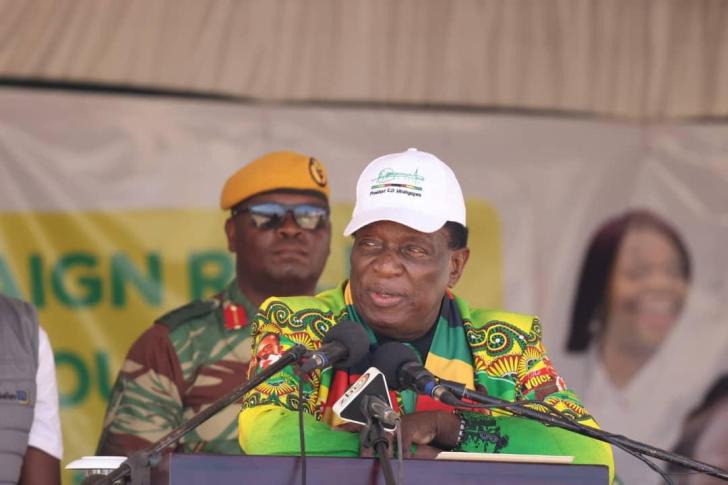News / National
Mnangagwa publicly denounces 'zviganandas'
6 hrs ago | Views

In a dramatic twist in Zanu PF's internal power dynamics, President Emmerson Mnangagwa has publicly denounced the party's controversial and influential group of politically-connected business dealers, popularly known as "zviganandas", during a fiery session of the National Consultative Assembly at the party's headquarters in Harare.
Addressing party delegates on Thursday, Mnangagwa shocked many by declaring "Pasi nezvigananda!" – a call to denounce and reject the powerful group of tenderpreneurs and shadowy wheeler-dealers long seen as benefitting from the ruling party's patronage networks. The phrase loosely translates to "Down with the zviganandas!"
The President's outburst came barely 24 hours after business mogul Kudakwashe Tagwirei, long considered a central figure in the party's business elite, was unceremoniously removed from the Zanu PF Central Committee. While party officials gave no formal explanation, insiders described the decision as a clear signal of shifting allegiances and rising tensions within the party's inner circles.
The term zvigananda - a colloquial Shona expression referring to corrupt, flamboyant dealers who thrive on access to state tenders and political protection — was popularised by Vice-President Constantino Chiwenga in March this year. Chiwenga has repeatedly lashed out at the group, accusing them of looting public resources and exploiting their political proximity for personal gain.
Earlier this week, Chiwenga escalated his criticism, warning ominously that the "day of reckoning" was "inevitably" approaching for those who have used the state as a feeding trough.
Mnangagwa's sudden denunciation appears to align him, at least rhetorically, with Chiwenga's growing campaign to distance the party from its deeply entrenched culture of patronage. Analysts say this could mark a decisive moment in the ruling party's ongoing factional struggles, with major implications for Zimbabwe's political and business elite.
Anonymous political analyst said the President's remarks could be a tactical manoeuvre amid increasing pressure over corruption and elite enrichment.
"This could be Mnangagwa reading the temperature and trying to realign with anti-corruption sentiments within the party and broader public. But the big question is whether this signals real action or just political theatre," said the analyst.
The removal of Tagwirei, widely viewed as Mnangagwa's key financial backer and enabler, sent shockwaves through Zimbabwe's political and economic establishment. His sprawling business empire has benefitted significantly from lucrative state contracts in energy, fuel, and agriculture.
With the 2028 elections on the horizon and factional battles heating up, Mnangagwa's repudiation of the zvigananda clique could signify a recalibration of alliances — or an attempt to appease growing discontent within both party ranks and the public.
As the National Consultative Assembly continues, party insiders are closely watching whether these rhetorical shifts will translate into tangible reforms or accountability measures — or whether the "zviganandas" will simply regroup under a different banner.
Addressing party delegates on Thursday, Mnangagwa shocked many by declaring "Pasi nezvigananda!" – a call to denounce and reject the powerful group of tenderpreneurs and shadowy wheeler-dealers long seen as benefitting from the ruling party's patronage networks. The phrase loosely translates to "Down with the zviganandas!"
The President's outburst came barely 24 hours after business mogul Kudakwashe Tagwirei, long considered a central figure in the party's business elite, was unceremoniously removed from the Zanu PF Central Committee. While party officials gave no formal explanation, insiders described the decision as a clear signal of shifting allegiances and rising tensions within the party's inner circles.
The term zvigananda - a colloquial Shona expression referring to corrupt, flamboyant dealers who thrive on access to state tenders and political protection — was popularised by Vice-President Constantino Chiwenga in March this year. Chiwenga has repeatedly lashed out at the group, accusing them of looting public resources and exploiting their political proximity for personal gain.
Earlier this week, Chiwenga escalated his criticism, warning ominously that the "day of reckoning" was "inevitably" approaching for those who have used the state as a feeding trough.
Mnangagwa's sudden denunciation appears to align him, at least rhetorically, with Chiwenga's growing campaign to distance the party from its deeply entrenched culture of patronage. Analysts say this could mark a decisive moment in the ruling party's ongoing factional struggles, with major implications for Zimbabwe's political and business elite.
Anonymous political analyst said the President's remarks could be a tactical manoeuvre amid increasing pressure over corruption and elite enrichment.
"This could be Mnangagwa reading the temperature and trying to realign with anti-corruption sentiments within the party and broader public. But the big question is whether this signals real action or just political theatre," said the analyst.
The removal of Tagwirei, widely viewed as Mnangagwa's key financial backer and enabler, sent shockwaves through Zimbabwe's political and economic establishment. His sprawling business empire has benefitted significantly from lucrative state contracts in energy, fuel, and agriculture.
With the 2028 elections on the horizon and factional battles heating up, Mnangagwa's repudiation of the zvigananda clique could signify a recalibration of alliances — or an attempt to appease growing discontent within both party ranks and the public.
As the National Consultative Assembly continues, party insiders are closely watching whether these rhetorical shifts will translate into tangible reforms or accountability measures — or whether the "zviganandas" will simply regroup under a different banner.
Source - businessdaily.co.zw

























